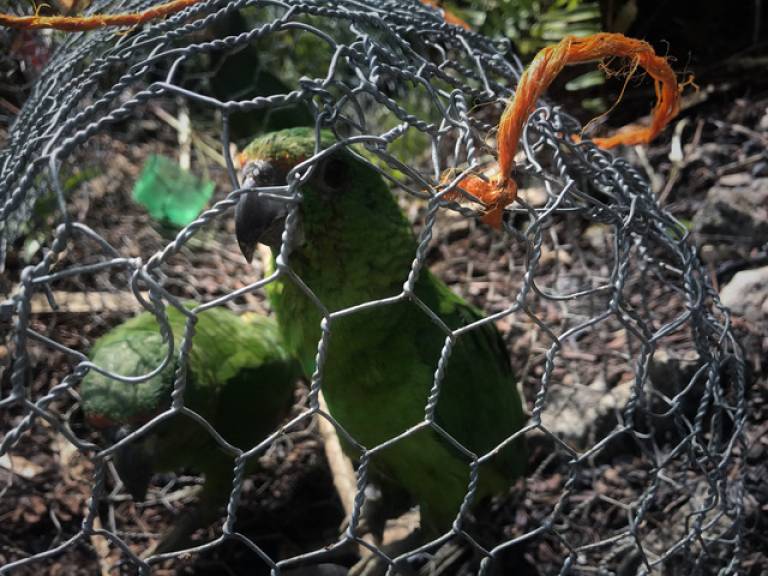Human Ecology Research Group Prize
1 July 2020
The Human Ecology Research Group is delighted to announce that following an anonymous donation from a past HERG member, we are able to award a one-off Human Ecology Research Group prize.

The prize criteria stipulate this should go to:
“the currently completing HERG PhD student who has shown the most exceptional intellectual originality and creative engagement on research in the area of social and environmental sustainability”.
A HERG staff panel has considered all potentially eligible HERG PhD students, who constitute a strong field, with several producing both excellent thesis drafts and also outstanding work in creative engagement with communities, practitioners and policymakers. Having considered a shortlist of strong contenders, the panel was unanimous in reaching their decision.
We have great pleasure in declaring that the prizewinner is Lydia Gibson, who is currently completing her PhD on “Saving parrots, Destroying Traditions”. The panel noted Lydia’s intellectual ambition, the outstanding creativity she brings to her work and which she has stimulated across HERG, and her exceptional engagement in energising community initiatives which she is co-producing in the course of her field work in Cockpit Country, Jamaica.
Congratulations, Lydia!
Lydia summarises her work in the abstract and project engagement list below:
ABSTRACT: SAVING PARROTS, DESTROYING TRADITIONS
In November 2017, after a decade of anti-mining campaigns by conservation stakeholders, the Prime Minister of Jamaica announced the designation of Cockpit Country as a protected area. A mid- elevation rainforest in west-central Jamaica, Cockpit Country is teeming with endemism and mired with distrust and diverging priorities. Conservationists cannot access information from the local community, the state, nor the physical landscape itself. State departments feel under-resourced and bound to central-government initiatives about which they are rarely consulted. The indigenous Maroons are disengaged from current conservation efforts as it undermines their clandestine forest use – among which, is the centuries-old practice of bird hunting. My doctoral research sought to parse impacts of conservation efforts in Cockpit Country forest on the lives, wellbeing, and traditional practices of the indigenous Maroons in hopes to promote environmental justice, knowledge- sharing and collaboration among stakeholders and mitigate cultural destruction resulting from loss of forest lore and resource use. Fieldwork was conducted over three parrot hunting seasons between 2017 and 2019, hunts were observed, participation in daily Maroon life was undertaken, and annual interviews were conducted with state departments, NGOs, and researchers. Parrot hunting became a lens through which a number of socio-natural phenomena, geopolitical agendas, and economic factors were expounded. The wealth of external factors that directly impacted catch yields, hunting frequency and intensity, as well as trapping success/failure demonstrated the futility of attempting to assess the sustainability of traditional practices as an outcome driven by local attitudes, perceptions, and motivations and of framing conservation spaces as sets of antagonistic interactions between ontologically distinct stakeholders.
ENGAGEMENT AND IMPACT
Beyond her PhD work, Lydia is ‘recognised species expert’ for the IUCN Red List species 2020 reassessment of A. agilis and A. collaria (Black-billed and Yellow-billed parrot); both are endemic to Jamaica - the focal species of her PhD research. She is also a National Geographic Explorer, and organised and was instructor for the British Ecological Society Annual Conference 2019’s Workshop on Indigenous Knowledge
Lydia’s other engagement projects include:
- A current stream restoration project in Cockpit Country, funded by Auckland Zoo Conservation Fund and Wild Planet trust, documenting and monitoring the presence of critically-endangered site-endemic frogs during the installation of state-sanctioned medical marijuana farms.
- Countermapping Cockpit: Funded by National Geographic Society, this work is creating an open-access, online, interactive map of Cockpit Country forest. Working with indigenous Maroons, traditional ecological knowledge alongside scientific methods (camera trapping, environmental data logs) are being used to create geolocated biocultural markers (environmental data, camera trap images, oral histories, photography, vignettes, infographs and video clips). This enables policy-makers and researchers to gain access to raw and contextual data to increase understanding of this inaccessible forest and improve conservation policy.
- Lydia plans to undertake a GPS tracking and genomics project with Maroon research assistants, fellow National Geographic explorers, and a number of Caribbean government agencies to assess the species distribution of black-billed parrots. (Currently on hold due to COVID).
Image caption: Black-billed parrot trapped by local hunters in Cockpit Country, Jamaica
Photo credit: Lydia Gibson
 Close
Close

